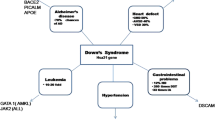Abstract
Hereditary hearing loss is one of the most common monogenic diseases in humans and, depending on the severity of symptoms and age of onset, dysfunction of one of the main sensory systems can cause significant problems for the affected individual and his/her social environment. The diagnostic workup of hearing impairment is complicated by a pronounced phenotypic variability and extensive genetic heterogeneity. Nevertheless, many forms of monogenic hearing impairment have been elucidated in recent years by genetic approaches. In addition to improved counselling and medical management of patients and families, these research findings have contributed significantly to the identification of functionally relevant molecules of the inner ear and have thus helped us to better understand the molecular physiology of hearing and the pathophysiology of hearing impairment.
Similar content being viewed by others
References
Morton CC, Nance WE (2006) Newborn hearing screening-a silent revolution. N Engl J Med 354:2151–2164
Davis AC (1989) The prevalence of hearing impairment and reported hearing disability among adults in Great Britain. Int J Epidemiol 18:911–917
Noben-Trauth K, Zheng QY, Johnson KR (2003) Association of cadherin 23 with polygenic inheritance and genetic modification of sensorineural hearing loss. Nat Genet 35:21–23
Toriello HV, Smith SD (eds) (2013) Hereditary hearing loss and its syndromes (Oxford monographs on medical genetics), 3rd edn. Oxford University Press, Oxford
Wang Q, Xue Y, Zhang Y et al (2013) Genetic basis of Y-linked hearing impairment. Am J Hum Genet 92:301–306
Altshuler D, Daly MJ, Lander ES (2008) Genetic mapping in human disease. Science 322:881–888
Boycott KM, Vanstone MR, Bulman DE, MacKenzie AE (2013) Rare-disease genetics in the era of next-generation sequencing: discovery to translation. Nat Rev Genet 14:681–691
Leibovici M, Safieddine S, Petit C (2008) Mouse models for human hereditary deafness. Curr Top Dev Biol 84:385–429
Vrijens K, Van Laer L, Van Camp G (2008) Human hereditary hearing impairment: mouse models can help to solve the puzzle. Hum Genet 124:325–348
Brown SD, Hardisty-Hughes RE, Mburu P (2008) Quiet as a mouse: dissecting the molecular and genetic basis of hearing. Nat Rev Genet 9:277–290
Whitfield TT (2002) Zebrafish as a model for hearing and deafness. J Neurobiol 53:157–171
Read AP, Newton VE (1997) Waardenburg syndrome. J Med Genet 34:656–665
Lewis MA, Quint E, Glazier AM et al (2009) An ENU-induced mutation of miR-96 associated with progressive hearing loss in mice. Nat Genet 41:614–668
Mencía A, Modamio-Høybjør S, Redshaw N et al (2009) Mutations in the seed region of human miR-96 are responsible for nonsyndromic progressive hearing loss. Nat Genet 41:609–613
Prezant TR, Agapian JV, Bohlman MC et al (1993) Mitochondrial ribosomal RNA mutation associated with both antibiotic- induced and non-syndromic deafness. Nat Genet 4:289–294
Estivill X, Govea N, Barcelo E et al (1998) Familial progressive sensorineural deafness is mainly due to the mtDNA A1555G mutation and is enhanced by treatment of aminoglycosides. Am J Hum Genet 62:27–35
Jacobs HT, Hutchin TP, Kappi T et al (2005) Mitochondrial DNA mutations in patients with postlingual, nonsyndromic hearing impairment. Eur J Hum Genet 13:26–33
Ameln S von, Wang G, Boulouiz R et al (2012) A mutation in PNPT1, encoding mitochondrial-RNA-import protein PNPase, causes hereditary hearing loss. Am J Hum Genet 91:919–927
Cheng J, Zhu Y, He S et al (2011) Functional mutation of SMAC/DIABLO, encoding a mitochondrial proapoptotic protein, causes human progressive hearing loss DFNA64. Am J Hum Genet 89:56–66
Ahmed ZM, Yousaf R, Lee BC et al (2011) Functional null mutations of MSRB3 encoding methionine sulfoxide reductase are associated with human deafness DFNB74. Am J Hum Genet 88:19–29
Richardson GP, Monvel JB de, Petit C (2011) How the genetics of deafness illuminates auditory physiology. Annu Rev Physiol 73:311–334
Dror AA, Avraham KB (2010) Hearing impairment: a panoply of genes and functions. Neuron 68:293–308
Petit C, Richardson GP (2009) Linking genes underlying deafness to hair-bundle development and function. Nat Neurosci 12:703–710
Safieddine S, El-Amraoui A, Petit C (2012) The auditory hair cell ribbon synapse: from assembly to function. Annu Rev Neurosci 35:509–528
Moser T, Predoehl F, Starr A (2013) Review of hair cell synapse defects in sensorineural hearing impairment. Otol Neurotol 34:995–1004
Del Castillo FJ, Del Castillo I (2012) Genetics of isolated auditory neuropathies. Front Biosci 17:1251–1265
Zdebik AA, Wangemann P, Jentsch TJ (2009) Potassium ion movement in the inner ear: insights from genetic disease and mouse models. Physiology 24:307–316
Alford RL, Arnos KS, Fox M et al (2014) American College of Medical Genetics and Genomics guideline for the clinical evaluation and etiologic diagnosis of hearing loss. Genet Med 16:347–355
Compliance with ethical guidelines
Conflict of interest. The corresponding author states that there are no conflicts of interest.
The accompanying manuscript does not include studies on humans or animals.
Author information
Authors and Affiliations
Corresponding author
Additional information
Translated from the original German by Karin Moan.
Rights and permissions
About this article
Cite this article
Kubisch, C. Hereditary hearing loss in humans: the importance of genetic approaches for clinical medicine and basic science. e-Neuroforum 5, 67–71 (2014). https://doi.org/10.1007/s13295-014-0061-9
Published:
Issue Date:
DOI: https://doi.org/10.1007/s13295-014-0061-9




